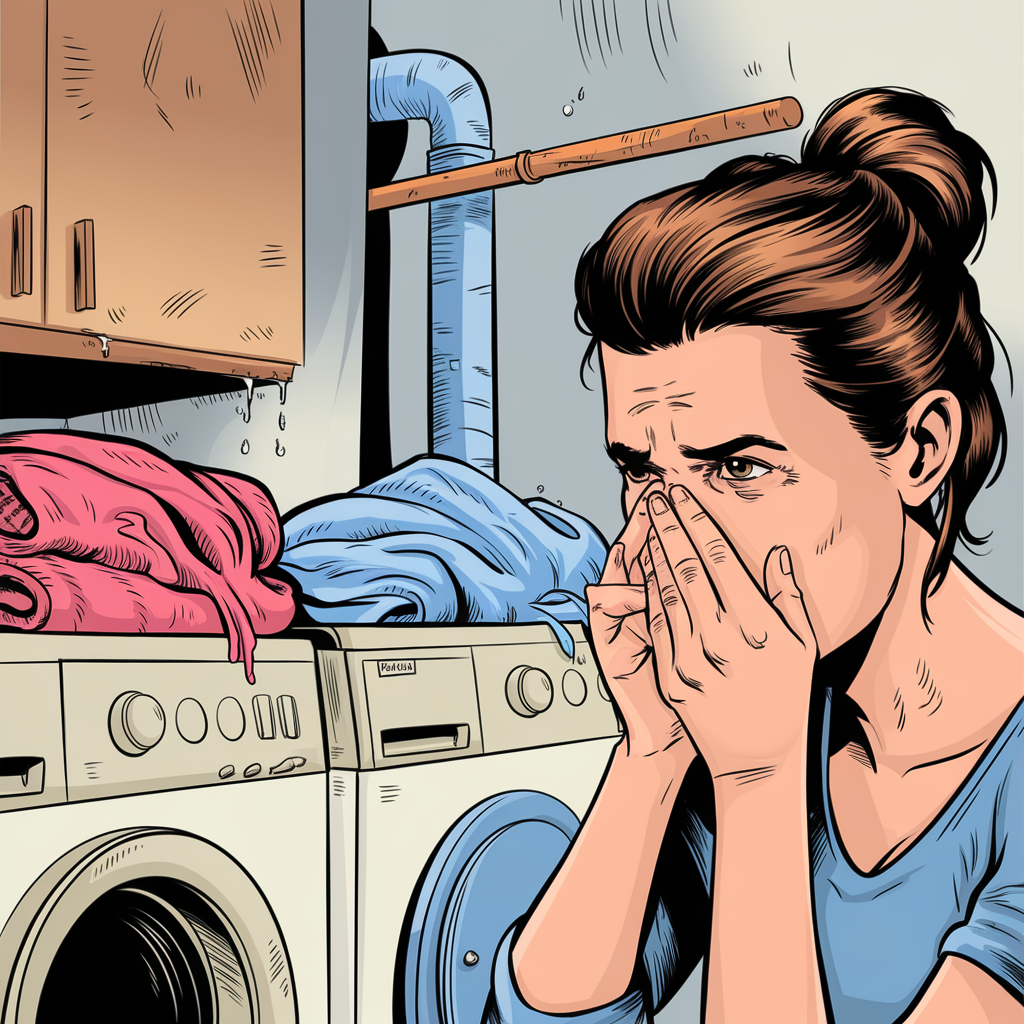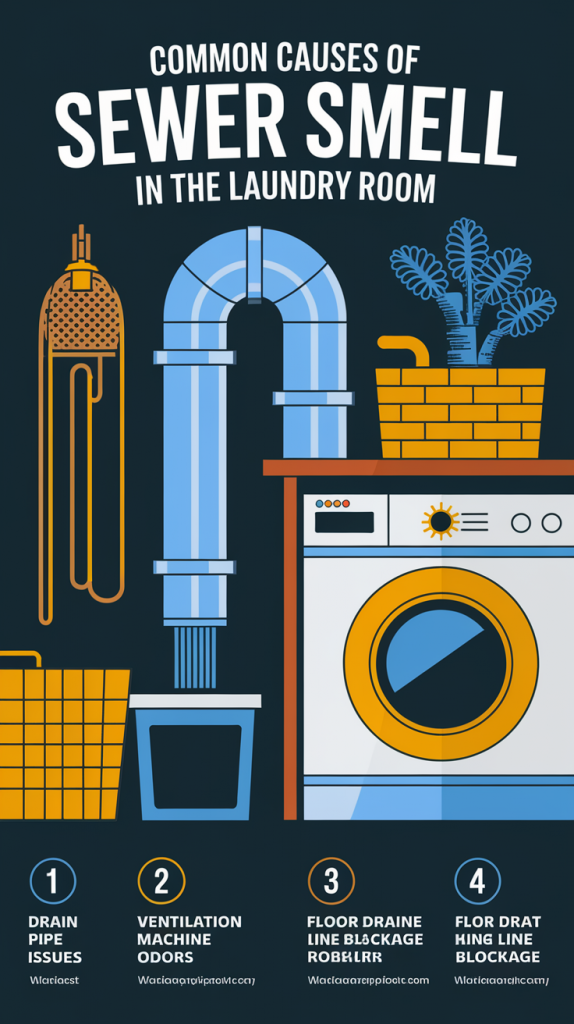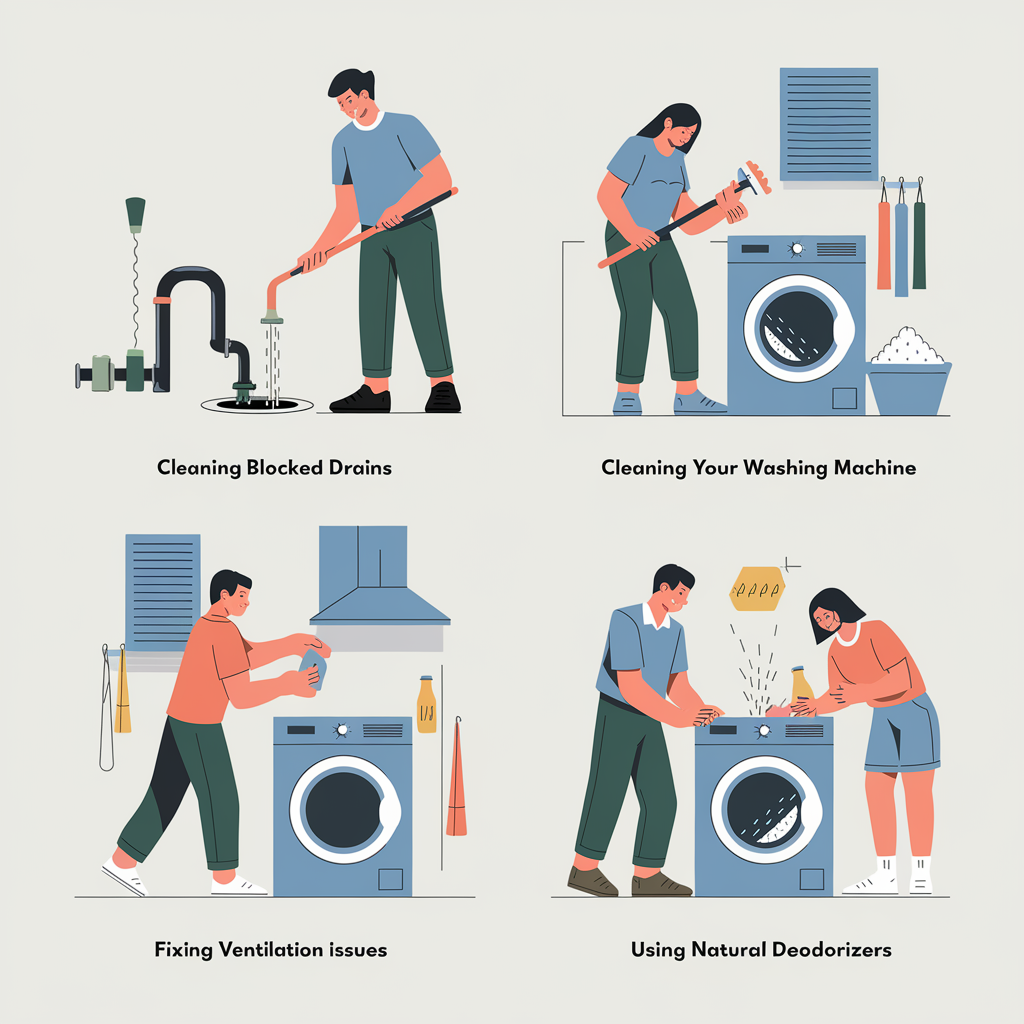Why Does My Laundry Room Smell Like a Sewer?

One time you might have walked into a laundry room waiting to breathe in the scent of fresh detergent but instead of that, you caught a nasty odor, which may have resembled that of a sewer. This is a very stressful situation that can be experienced by many people. It is a problem that if not checked can make washing day of the week the longest day.
But what’s worse… This smell may not just be the air get on your nose, it may be a signal of a hidden issue in the pipes or ventilation of your room. In this article, we will go through the causes of sewer-like smells in your laundry room with you and, to be more precise, we will also hand you practical solutions to solve the problem yourself. So let’ s get started!
Common Causes of Sewer Smell in the Laundry Room
Surely the odor emanating from your laundry room is enough evidence to show that there are a number of suspected work suspects behind it. Usually the most frequent cause of such a smell is a clogged drain. This paragraph will take a more in-depth look at these issues.

1. Drain Pipe Issues
The top ranking of these reasons is a fault in your drain pipes that sustain the smell of the laundry room. Drains, where waste comes in contact with cloth particles and cleaning chemicals, may fill up with such debris, lint, and soap scum, which may lead to the water stagnation and unpleasant smells being emitted.
Separately, sometimes, the P-trap gets dry. The P-trap is a U-shaped pipe that sits under your floor drain to prevent sewer gases from escaping into your home. When it gets dry, the gases will leak out of the drain, making the nasty smell.
Common signs of drain pipe issues include:
- Slower than usual water flow through the drain
- A distinct gurgling sound from the drain
- Very bad and comes every now and then
2. Ventilation Problems
Incorrect ventilation is another trouble like that. Ventilation network of laundry room is the main source of that kind of problem. If your ventilation system is blocked or not correctly installed in your laundry room, then the odors will be produced in the long run, it will smell like you are in the sewer’s mouth indeed.
Skylight in the room is the best way to ensure appropriate ventilation, and the expulsion of steam and any gasses thereof. Ignored or cracked the ventilation that is needed for the room can lead to the situation where moisture is too much.
Proper VentilationImproper VentilationThere’s no smell to keepBuilds up more odorThe air circulates smoothlyGrows moldDry environmentDamp, musty air
3. Washing Machine Odors
Sometimes the smell problem is not in the pipes or the ventilation but in the washing machine itself. The possibility of mold and mildew growth in the rotating drum, particularly when an individual prefers to wash clothes with cold water on a regular basis, is very high. Additionally, detergent film is the reason for a rusty or septic smell in the hoses.
Places that you can check to see if the problem is there:
- Mold or mildew inside the drum.
- Build-ups on the detergent drawer.
- Water or some remnants in the hoses.
4. Floor Drain and Sewer Line Blockage
One of the cases, the source of the smell may be a blocked floor drain or the overflow of a sewer line. If the floor drain is backed, then the indoor smog having g. A choked sewer line, on the other hand, is capable of pushing waste products up into your homes, which as a result, not only do your cheeks knock off but also can kill you if not be treated strictly.
In situations like these the symptoms of blocked floor drains and sewer lines include:
- Water standing around the drain
- Backup of sewage in sinks or bathtubs
How to Identify the Source of the Odor
The very first step to identify and solve the problem is to identify the problematic aspects. Here’s how you can encounter the smell and locate its exact origin:
- Visual Examination: Have a look around the channels, pipelines, and joints of the washing machine for any visibility of mold, dirt, or pool water.
- Odor Test: Try to instead of thinking over your belief of the smell’s in that direction just listen to your nose and find out by tracing it. Check near the drains, washing machine, and vents.
- P-trap Experiment: Fill a gallon with water and pour it down the floor drain. If the odor vanishes the P-trap was sure dry.
- Air Quality Control: The laundry room’s ventilator should be looked at first to make sure there are no obstacles. In case the flows are not free, the air circulation will not be proper and there may be enclosed odors.
DIY Solutions to Remove the Sewer Smell
Once you’ve identified the problem, now for yourself you can try these effective and fun DIY techniques that can bring the marshy odor in your house to zero.

1. Clearing Blocked Drains
You can use a plumber’s snake or a chemical drain cleaner to clear a blocked drain by dislodging any debris buildup. If it’s not too serious, pour a mix of baking soda and vinegar down the drain followed by hot water for the minor clogs.
The drained water should be poured if the P-trap was dry, only the water and that should be done every once in a while so that it stays full and odors do not escape from the drain.
2. Cleaning Your Washing Machine
Your washing machine must be regularly cleaned, ensuring that there is no sign of mold and mildew in the process. Here is a step-by-step guide:
- Wipe the inside of the drum using a moist rag.
- Use of an empty hot water cycle with vinegar or washing machine cleaner to run it through the cleaning process.
- Start by disposing of the cleaning remnants, then pouring warm water on it to run it out to the rest of the circulation system.
- Inspect and cleanse the hoses to ensure no water or lather is entrapped in pipes
3. Fixing Ventilation Issues
If lack of air is the cause of odor in your laundry room, make sure to keep the air vents clean from dust or such. If later you felt that with the usage of some extra ducting, the air flow would be more improved using window units.
Tips
After fixing the source, one can be able to utilize some natural deodorizers to eliminate all the odors. The smells can be pulled out with help of vinegar, baking soda, or by using oils such as lavender, or tea tree oil.
When to Call a Professional
While the majority of reasons for laundry room odors can be in a DIY know-how, definitely some situations need the support of an experienced plumber.

If professional if:
- Your house forever gives off that sewerage smell even with you trying out DIY methods.
- Wastewater floods if you happen to notice that sewage is backing up to your house.
- The trouble appears to be in the main sewer line.
- Water and mold growth are the signs of massive damage that you notice.
An expert plumber is the one who can survey your pipes, drains, and water systems, and determine the issue before making the repairing.
Preventing Future Sewer Smells
With that said, the only effective way to achieve the laundry room to stay fresh is by cleaning it from time to time.
Maintenance Recommendations
- Monthly: Carry out a hot water cycle in your washing machine in order to get rid of mold and other detergent build-up.
- Every few months: Put together a combination of baking soda and vinegar then slowly pour it down the drains to prevent clog.
- Seasonally: Make certain your ventilation system is in proper condition and without any obstructions.
Checklist:
- Make a point to regularly clean the drains.
- Maintain the washing machine.
- Ensure the ventilation is correct and do it properly.
Proactive Monitoring
On top of that, one of the early waking signals that you should watch out for is poor flow of water from the shower which could be a symptom of the development of a blockage. At the beginning of the problem, when these issues are still in their infancy, you will be able to fix them with minimum fears.
Frequently Asked Questions (FAQs)
- How does the heavy rainfall cause the sewage odor in my laundry room? Heavy rain can cause an increase in water pressure which then forces the toxic gases through the drains into the buildings.
- Will the use of laundry detergent aid in a sewer smell happening? It is actually the after-effect of unwanted residues that can give off a musty odor.
- If my washer has a bad smell what do I do? Clean the inside of the drum and detergent drawer, and wash the equipment with hot water and vinegar without any contents.
- How often can I clean the washing machine and drains? It is recommended to clean your washing machine once a month and drain cleaning should be done every few months to keep yourself away from the problems of blockage.
- Can I use bleach to remove the sewer smell? Yes, bleach has the power to effectively kill germs and alleviate odors. However, do not use it too much because over time the pipes will be damaged by it.
Conclusion
At times, Sewer smells in your laundry room can be unpleasant, but they’re not impossible to fix. The smell might be coming from a clogged drain, insufficiently ventilated room, or the washing machine which needs to be checked. The key to sorting foolishness out is getting to the bottom of, with the main stress on the smell. Through the suggestions that are described here, you can very easily refresh your laundry space and don’t let smells be a nuisance. Grab the opportunity to introduce a pleasant indoor space and save some money on cleaners by washing your clothes.

I just had to share how this article inspired me to switch up not only my routine but my hairstyle too! After diving into those tips about cleanliness, I decided to make a drastic change to my hair. I went from long locks to a chic bob, and let me tell you, it feels freeing! I feel like I shed all that stagnant energy, just like cleaning up my laundry room. If you’re wondering what else you can refresh in your life, take the plunge and try something new, whether it’s a hairstyle or tackling those smelly home issues!
Hey there! So I was diving into that article about laundry room smells, right? It’s wild how those hairstyles can totally vibe with different hair types! Like, if you’ve got curly hair, those loose waves would be a perfect fit, adding a relaxed feel while keeping your look fresh. On the flip side, straight hair really slays with sleek styles that seem effortlessly chic. Seriously, whatever your hair type, there’s a do that can totally match your laundry room aesthetic and keep things looking fab while you tackle odors! Keep it fresh, folks!